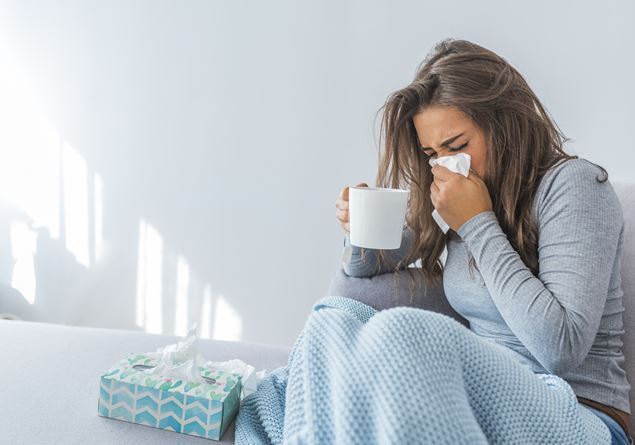by Nicoletta L. Bagliano
The flu is unforgiving again this year and the peak is expected in the next ten days. After last week’s decline due to the closure of schools for the holidays, infections are clearly increasing, especially among young adults and the elderly. According to the RespiVirNet report (https://www.epicentro.iss.it/influenza/respinews#vir) of the Higher Institute of Health (ISS), in the last seven days there have been 667 thousand Italians affected by the Aussie virus, bringing the total number of patients to 5.8 million throughout the country (the most “suffering” regions are Tuscany, Marche, Lazio, Abruzzo, Campania, Puglia, Sicily and the province of Bolzano). Parainfluenza viruses also add to the complication of the situation, with symptoms that are anything but negligible, which often overlap, confusing the waters and increasing concern in the family, especially if there are small children or people over 70.
«Those who have had the vaccine can still present the symptoms, but in a milder form; who hasn’t done it… remember next year! Now it might be late (since it takes about 10 days for it to activate effectively). It is especially important for frail and elderly people, as is the booster of the anti-Covid vaccine, which few people do. Sars-Cov-2 is still in circulation and should not be taken lightly”: these are the recommendations of Fabrizio Pregliasco, professor of Hygiene at the University of Milan, medical director of the Galeazzi-Sant’Ambrogio hospital in Milan and director of the Respiratory Virus Observatory (www.virusrespiratori.it). We asked him the 10 most common questions about the flu alarm. Here’s what he replied to us.
- How can I tell if it’s “real” flu?
The flu acts as an “umbrella” for many different manifestations. In order to be sure that you are affected, three elements must be present: fever rise above 38 degrees, at least one respiratory symptom and at least one systemic symptom, such as muscle pain or general malaise.
- What medications can I use?
Self-medication medicines, those marked with a red sticker on the package, can be purchased in pharmacies without a medical prescription. There are many active ingredients available: from anti-inflammatories to antipyretics to antitussive products. The important thing is to use it responsibly, with the aim of mitigating flu symptoms (in fact they certainly don’t cure the virus!), but not eliminating them, in order to be able to monitor the disease over time, observing its progress.
- If I have an antibiotic at home should I take it?
Absolutely not. Flu is a viral disease, so antibiotics are not effective in fighting it. Using it equally favors, on the contrary, resistance to this type of drug.
- Does the fever always have to be lowered?
No, because the rise in body temperature is a form of defense of the body and therefore should not be hindered in any case. When it exceeds 38 degrees then yes, an antipyretic is recommended.
- Who do I ask for an opinion so I don’t make mistakes?
First of all to the pharmacist, who is able to advise the person, also based on their clinical picture. Only subsequently, if the situation does not improve, is the general practitioner obviously the contact person.
- When do I go to the doctor?
If the symptoms do not improve after 3-4 days (or if they improve immediately but then worsen again), it is better to contact your GP. In fact, only he, after a thorough examination, will be able to establish the appropriate therapy for the case and, if he believes that a bacterial superinfection has occurred, prescribe the antibiotic
- Which and how many viruses are there in circulation?
There are so many: 262 were recorded this winter. The main ones, in addition to the flu, are the respiratory syncytial virus and the Metapneumovirus. Then there is the large family of Enteroviruses, which give rise to a series of gastrointestinal symptoms, such as nausea, vomiting and dysentery.
- If I take the drugs, can I still go out?
The answer is no. Influence should never be underestimated. So even if your symptoms start to improve with medication, you don’t want to hang around. To protect others, first of all. And then to avoid worsening your clinical condition. Better to stay at home in the heat, rest (even if not necessarily in bed), follow a light diet at the table and above all hydrate. Drinking a lot of water is important, especially for the elderly who feel less thirsty. If you feel nauseous, take frequent small sips. Alternatively, hot tea and herbal teas are also fine.
- Do I take the anti-Covid swab?
The nasopharyngeal swab is an extra precaution, not always necessary. It makes sense to do this, however, if you have a fragile person in the family. However, it is useful in the case of fragile patients (for example a cancer patient or a chronic disease) and the elderly: in this case, even just in the presence of a cold, the swab should be done.
- In which cases is it better to go to the emergency room?
It is recommended to go to hospital, especially if you are fragile, only in case of obvious breathing difficulties with an increase in heart rate. Otherwise the flu can be managed at home and resolves within a week to ten days.










